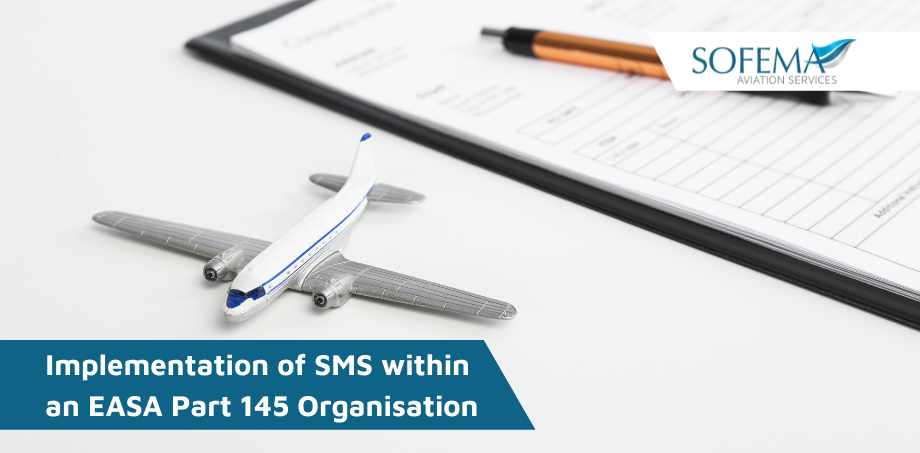Sofema Online reviews the deadlines for compliance with the requirements for the Implementation of Safety Management System within an EASA Part 145 Organisation.
- When do I need to Implement SMS within my Part 145 Organisation?
- What are the SMS Deadlines Regarding EASA Part 145 Approval?
- Implementation of Safety Management Systems (SMS) in Part 145 Maintenance Organisations in accordance with Regulation (EU) 2021/1963.
Implementation of Safety Management System Introduction
Regulation EU 2021/1963 which amends Regulation (EU) 1321/2014, introducing Safety Management System (SMS) requirements for Part 145 Maintenance Organisations.
- Regulation (EU) 2021/1963 shall apply from 2 December 2022.
- Organisations already holding a valid approval at this date, shall correct any finding for non-compliance related to Part 145 requirements introduced by this regulation before 2 December 2024 at the latest.
Concerning Organisations holding a valid Part 145 approval before 2 December 2022
- Need to implement SMS complying with Section A of Regulation (EU) 2021/1963 before 2 December 2024.
Application for SMS implementation by Approval Holders
- Via Application Package (EASA provided to Third Countries – for EASA Countries consult with your Competent Authority).
- EASA Form 21 which contains a clear statement in block 6.3 “Application Type”, e.g., “change for SMS implementation i.a.w. Regulation (EU) 2021/1963”.
- To include the following:
o Implementation plan including timelines for compliance with Regulation (EU) 2021/1963;
o Revised MOE reflecting the amended organisation procedures i.a.w. Regulation (EU) 2021/1963;
Note – It is recommended that this application is not combined with other changes.
Effective 2 December 2022 until 2 December 2024:
- The oversight of the Part 145 approval is performed according to Regulation (EU) 1321/2014 as amended by Regulation (EU) 2021/1963;
- At the time of the first audit (intermediate, change or continuation) of an Organisation not yet compliant with Regulation (EU) 2021/1963, EASA will raise a generic transition finding (within the “SMS change phase”), instead of raising non-compliances against each individual regulatory paragraphs introduced by the new Regulation. The due date of this finding will be set by default on 2 June 2024, to allow EASA the necessary timeframe to assess any corrective actions before the end of the transition period.
- For requirements which were not impacted by the new Regulation, standard findings will be raised as necessary in case of identified non-compliances;
- Any application for change received after 2 December 2023 will not be processed, if EASA has not yet received an acceptable SMS application package as above.
Concerning Organisations Applying for a New EASA Part 145 approval after 2 December 2022
As of 2 December 2022, a new Part 145 certificate can only be issued for Organisations which are in compliance with Regulation (EU) 2021/1963. The following cases may be considered:
- In the case of Initial investigations already ongoing (July 2022) can be completed before 2 December 2022 and old rules apply
- In the case of a New Application, the initial investigation process will have to be supplemented to include verification for compliance with Regulation (EU) 2021/1963.
Recommendation from EASA regarding applications which are submitted post-July 2022 – should target directly compliance with the “new Part 145” (SMS Obligations) as amended by Commission Regulation (EU) 2021/1963.
Next Steps
Follow this link to our Library to find & Download related documents for Free.
Sofema Aviation Services & Sofema Online offer multiple EASA regulatory compliant and vocational courses covering all aspects of EASA Part 145 approval including SMS implementation and HF & SMS compliant training Initial & Recurrent Training.
For additional information please email team@sassofia.com
Tags:
aviation, Aviation Maintenance, EASA Part 145, Part 145, Sofema Aviation Serives, Aviation SMS, Sofema Online, Safety Management Systems (SMS), Regulation (EU) 2021/1963, Aviation Safety Management Systems





